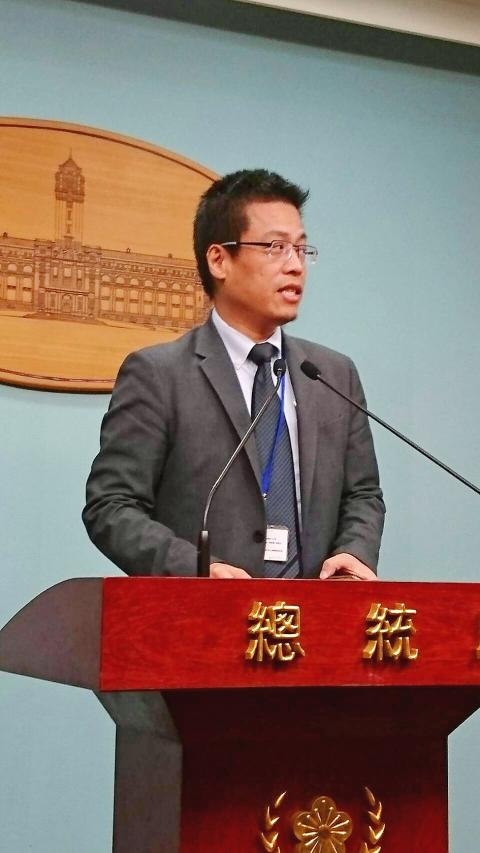China is considering amending its “Anti-Secession” Law to specify more conditions under which it would invade Taiwan, the Yomiuri Shimbun reported on Tuesday.
The story, written by the Japanese daily’s Beijing correspondent, said that Chinese President Xi Jinping’s (習近平) administration is considering revising the act, or creating a national unification act, to prevent US President Donald Trump’s administration from further intervening in Taiwan’s affairs.
Enacted in 2005, the “Anti-Secession” Law mandates that the Chinese government would take non-peaceful methods to defend the nation’s sovereignty and ensure that national territories remain intact should Taiwan secede from China, or if there is no possibility of a peaceful unification.

Photo: Chung Li-hua, Taipei Times
One of the changes it is considering would be an explicit statement by President Tsai Ing-wen’s (蔡英文) administration that Taiwan would not accept the “one China” principle as a condition for invasion, the report said.
Clarifying the conditions for the act is designed to increase the pressure on Taiwan, it said.
Sources claimed that China is also looking into drafting a national unification act.
Xi has been promoting a “grand resurgence of the Chinese nation [zhonghua minzu, 中華民族]” which is inalienable from unification, and China’s National Security Act, passed in 2015, stipulates that “it is the joint obligation of all Chinese citizens, including our compatriots in Hong Kong, Macau and Taiwan, to uphold national sovereignty, seek unification and maintain the integrity of territorial claims,” they said.
One of the sources said that China has “arrived at the stage where it can now use the law to define its path for unification,” the report added.
Commenting on the report, Presidential Office spokesperson Alex Huang (黃重諺) said the government would continue to monitor developments in relation to the report.
The Mainland Affairs Council declined to comment on the report, but said it would continue to update its contingencies based on China’s Taiwan policy and its actions.
Resorting to non-peaceful actions or threats on cross-strait issues is not conducive to future relations, the council said, adding that the stable development of cross-strait relations, and thereby safeguarding the interests of people on both sides of the Strait, is the joint responsibility of the two sides.
China’s Taiwan Affairs Office spokesperson An Fongshan (安峰山) said Beijing would defend its sovereignty and territorial integrity through rule of law.
Additional Reporting by Chung Li-hua

The CIA has a message for Chinese government officials worried about their place in Chinese President Xi Jinping’s (習近平) government: Come work with us. The agency released two Mandarin-language videos on social media on Thursday inviting disgruntled officials to contact the CIA. The recruitment videos posted on YouTube and X racked up more than 5 million views combined in their first day. The outreach comes as CIA Director John Ratcliffe has vowed to boost the agency’s use of intelligence from human sources and its focus on China, which has recently targeted US officials with its own espionage operations. The videos are “aimed at

STEADFAST FRIEND: The bills encourage increased Taiwan-US engagement and address China’s distortion of UN Resolution 2758 to isolate Taiwan internationally The Presidential Office yesterday thanked the US House of Representatives for unanimously passing two Taiwan-related bills highlighting its solid support for Taiwan’s democracy and global participation, and for deepening bilateral relations. One of the bills, the Taiwan Assurance Implementation Act, requires the US Department of State to periodically review its guidelines for engagement with Taiwan, and report to the US Congress on the guidelines and plans to lift self-imposed limitations on US-Taiwan engagement. The other bill is the Taiwan International Solidarity Act, which clarifies that UN Resolution 2758 does not address the issue of the representation of Taiwan or its people in

US Indo-Pacific Commander Admiral Samuel Paparo on Friday expressed concern over the rate at which China is diversifying its military exercises, the Financial Times (FT) reported on Saturday. “The rates of change on the depth and breadth of their exercises is the one non-linear effect that I’ve seen in the last year that wakes me up at night or keeps me up at night,” Paparo was quoted by FT as saying while attending the annual Sedona Forum at the McCain Institute in Arizona. Paparo also expressed concern over the speed with which China was expanding its military. While the US

SHIFT: Taiwan’s better-than-expected first-quarter GDP and signs of weakness in the US have driven global capital back to emerging markets, the central bank head said The central bank yesterday blamed market speculation for the steep rise in the local currency, and urged exporters and financial institutions to stay calm and stop panic sell-offs to avoid hurting their own profitability. The nation’s top monetary policymaker said that it would step in, if necessary, to maintain order and stability in the foreign exchange market. The remarks came as the NT dollar yesterday closed up NT$0.919 to NT$30.145 against the US dollar in Taipei trading, after rising as high as NT$29.59 in intraday trading. The local currency has surged 5.85 percent against the greenback over the past two sessions, central